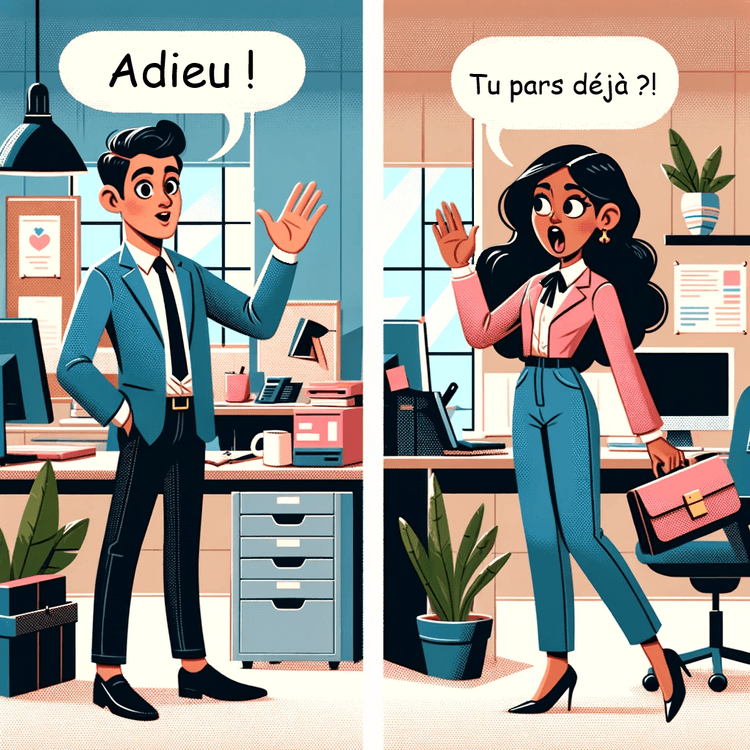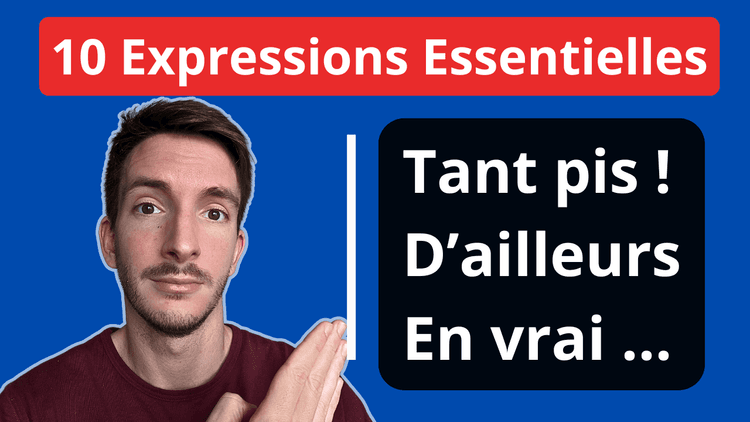
Mastering French Greetings: A Comprehensive Guide

Difficulty:A1
-
December 25, 2023
12/25/2023
Today, we're going to delve into the simple but essential art of greeting, inquiring after, and bidding farewell in French. These basic expressions are the first building blocks of your language-learning adventure. They pave the way for pleasant conversations and display your respect and interest for French culture. Whether you are a beginner or looking to refresh your skills, this article is perfect for you. So, are you ready to enrich your vocabulary and shine in your daily interactions? Let's get started!
Part 1: Greeting Expressions
Let's look at some expressions you can use in your everyday life to greet the people around you with ease and courtesy.
| saluer | to greet |
| tout le monde | everybody |
| Bonjour | Hello |
| Salut | Hi |
| Enchanté(e) de vous rencontrer | Pleased to meet you |
Now let's imagine a short dialogue among three people working at the same company - Anne and Paul, who already know each other, and Julien, a newcomer:
Anne : Salut Paul, ça va ?
Paul : Bonjour Anne, oui ça va bien, merci. Et toi ?
Anne : Ça va super, merci ! Ah, voici Julien. Julien, je te présente Paul.
Julien : Bonjour Paul, enchanté de vous rencontrer.
Paul : Salut Julien, ravi de te rencontrer. Tu es nouveau ici ?
Julien : Oui, c'est mon premier jour.
Paul : Bienvenue alors ! Tu vas voir, tout le monde est très sympa ici.
In this dialogue, we see different ways to greet in French. "Bonjour" is a formal greeting used at any time of the day, while "Salut" is more informal and can be used among friends. "Enchanté de vous rencontrer" is a polite and formal expression used when meeting someone for the first time, while "Ravi de te rencontrer" is its informal version.
Le saviez-vous ?
Among French-speaking communities, greetings can vary quite a bit. In Quebec,, "allô" is used to say bonjour, not just on the phone. In Switzerland and some regions of France, "Adieu" can even mean "bonjour", originating from an old formula meaning "Je vous recommande à Dieu". It’s not always easy to keep up 😵.

Flashcards
Shuffle
Swap faces
Loading...
Part 2: Asking After Expressions
After learning how to say hello, now let's move on to asking "How are you?". It is a simple but crucial question to be polite and show interest in others. It's constantly used and veryoften following greetings, among friends, colleagues, or people we've just met. We're going to look at how to ask and respond in different ways, according to different contexts. Let's proceed!
Comment allez-vous ?
How do you do?Alternatives: Comment vas-tu ? - Ça va ?
Bonjour Madame, comment allez-vous ?
The formal way of asking someone about their well-being. If you're on a first-name basis, you'd say: Comment vas-tu ?.
Le saviez-vous ?
The phrase 'Comment ça va ?' originates from an old medical question. Back then, doctors would ask this to find out if people were doing well in terms of their bowel movements. It was important for them to know this for overall health reasons. Over time, 'Comment ça va ?' has evolved into a way to ask someone if they are doing well in general.
Ça va ?
How's it going?Alternatives: Tu vas bien ? - Comment ça va ?
Salut Marc, ça va ?
An informal question to ask someone how they are doing.
Quoi de neuf ?
What's new?Alternatives: Ça va ? - Tu vas bien ?
Quoi de neuf depuis notre dernière rencontre ?
Used to ask if there is anything new in someone's life.
Je vais bien
I'm fineAlternatives: Je vais très bien
Je vais très bien, merci.
A standard response to say that one is doing well, often followed by 'merci' for politeness. To express that you are doing particularly well, you can add très bien.
Ça va moyen
I'm so-soAlternatives: Ça va pas mal
Ça va moyen, je suis un peu fatigué.
Used to express that one is not doing very well, but not bad either.
Ça ne va pas
I'm not doing wellAlternatives: Ça va mal - Je ne vais pas bien
Tu as l'air triste, ça ne va pas ?
Used to express that one is not doing well or is unhappy.
Flashcards
Shuffle
Swap faces
Loading...
Part 3: Farewell Expressions
Finally, we're going to discuss how to say goodbye in French. It's a key step to conclude a conversation and show that you appreciated the other person's company. Farewell expressions vary depending on the situation and the relationship between the people. They can express both intentions for future meetings and considerations for the needs and well-being of others.
| Bonne journée | Have a good day |
| Au revoir | Goodbye |
| À demain | See you tomorrow |
| À la prochaine | See you next time |
| À bientôt | See you soon |
| À tout à l'heure | See you later |
| Prends soin de toi | Take care of yourself |
Let's imagine another short dialogue at the end of an office day between Anne, Paul and Julien, the same characters as in our first part. This time, they're parting ways and saying goodbye:
Julien : Bon, je dois y aller. Au revoir, c'était un plaisir de travailler avec vous aujourd'hui.
Paul : À la prochaine, Julien.
Anne : Oui, à demain !
Paul : Et bien je vais aussi rentrer. À ce soir Anne.
Anne : Non, désolée Paul, je ne viendrai pas ce soir. Je suis un peu fatiguée.
Paul : Ah, d’accord. Dans ce cas à demain ! Prends soin de toi, Anne.
Anne : Salut, Paul.
In this dialogue, Julien uses a polite and formal form ("Au revoir") because he is not yet familiar with his colleagues. Paul and Anne are more informal. They give hints about when they will see each other again: "À demain" for the next day, "À ce soir" for the current evening, and "À la prochaine" or "Salut" for an unspecified future meeting. Note that "Salut" can be used to say hello or to take leave.
Flashcards
Shuffle
Swap faces
Loading...
Partie 4 : Entrainement
Here are two exercises to help you assimilate the vocabulary we have covered in this article. Good luck with them!
Loading...
Loading...
Conclusion
We have learnt together how to greet, inquire after, and say goodbye in French. I hope this has helped and that you feel better equipped to speak French. It's a good start, but there's much more to learn.
If you want to continue learning, check out our video courses on Udemy. They are designed to help you improve your French speaking skills. There are lessons, exercises, and plenty of helpful tips.
Click here to access the video lessons
Whether you're beginning or looking to improve, our courses offer something for everyone.
You can also continue your learning on our blog with the following article: Le Vocabulaire Essentiel pour Se Présenter
See you soon and happy learning!

Subscribe to our newsletter
Latest posts
Browse all posts
Subscribe to our newsletter
Stay informed and get a free video

